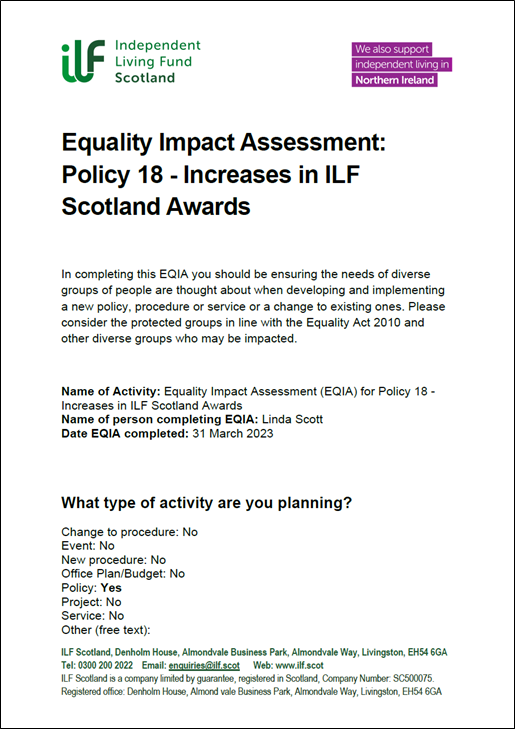
In completing this EQIA you should be ensuring the needs of diverse groups of people are thought about when developing and implementing a new policy, procedure or service or a change to existing ones. Please consider the protected groups in line with the Equality Act 2010 and other diverse groups who may be impacted.
Name of Activity: Equality Impact Assessment (EQIA) for Policy 18 - Increases in ILF Scotland Awards
Name of person completing EQIA: Linda Scott
Date EQIA completed: 31 March 2023
Change to procedure: No
Event: No
New procedure: No
Office Plan/Budget: No
Policy: Yes
Project: No
Service: No
Other (free text):
Policy and wording review.
All 2015 fund recipients.
The protected characteristics to consider are: Age, Disability, Sex, Race, Religion or Belief, Gender Reassignment, Sexual Orientation, Marriage and Civil Partnership, Pregnancy and Maternity. It will also be helpful to consider these groups more widely in relation to their socio-economic status that includes such factors as educational attainment, occupation, income, wealth and social deprivation.
Please mark as Yes or No. If yes use the Comments column to describe what the potential impact is. What are your sources of evidence?
(Try to think about both positive and negative impacts. There are lots of sources of data to help answer this question. Diversity Networks, the Diversity Report or Diversity & Inclusion team may offer some useful information. Previously completed EQIAs may also offer answers to questions you may have).
Age: No
Comments:
Disability: No
Comments:
Gender Reassignment: No
Comments:
Marriage and Civil Partnership: No
Comments:
Pregnancy and Maternity: No
Comments:
Race: No
Comments:
Religion or belief: No
Comments:
Sex: No
Comments:
Sexual orientation: No
Comments:
(For example, carer status, single parent, economic exclusion. It is important not to limit your thinking just to the protected characteristics listed above. This question is broadening the EQIA out to be more inclusive. The impact might be a negative one (e.g. making that decision could decrease the opportunity for some people to participate) or it could be a positive one (e.g. by making that decision, more people are able to take part in the activity).)
Carers: No
Comments:
If there are any gaps in information that make it difficult or impossible to form an opinion on how your policy, service or change might affect different groups of people, please take the time to gather information to help you make an informed answer (for example, review statistics, survey results, complaints analysis, consultation documents, customer feedback, existing briefings submissions or business reports, comparative policies from external sources and other Government Departments etc).
Desk research, consultation with ILFS Assessors, Specialist Caseworkers, Recipients, Award Managers, Scottish Advisory Group, NI Stakeholder Group.
Age: No
Disability: No
Gender Reassignment: No
Marriage and Civil Partnership: No
Pregnancy and Maternity: No
Race: No
Religion or belief: No
Sex: No
Sexual orientation: No
No adverse impact determined
Age: Yes
Comments: As recipients are an aging population, they are more likely to experience age related characteristics such as decline in health conditions and increased support and assistance needs including financial management assistance, and changes to support / assistance arrangements. Policy 18 sets out the scope and boundaries of funding within the maximum sum, but also provides provision for anticipated increases in costs. Furthermore given the fluid nature of health and disability overtime, the policy includes a clause for exceptional circumstances not otherwise detailed.
Sources: https://www.gov.scot/publications/scottish-government-position-paper-mobility-component-disability-assistance-older-people-daop/
Disability: Yes
Comments: All recipients live with significant health conditions / impairments, and the evidence indicates these can fluctuate over time which can have a direct impact on support and assistance arrangements and associated costs. Policy 18 sets out the scope and boundaries of funding within the maximum sum, but also provides provision for anticipated increases in costs. Furthermore given the fluid nature of health and disability overtime, the policy includes a clause for exceptional circumstances not otherwise detailed.
Sources: A Fairer Scotland For Disabled People - Our Delivery Plan to 2021 for the United Nations Convention on the Rights of Persons with Disabilities
Gender Reassignment: No
Marriage and Civil Partnership: No
Pregnancy and Maternity: No
Race: No
Religion or belief: No
Sex: No
Sexual orientation: No
The purpose of Policy 18 is to inform recipients and / or their representatives of the scope and boundaries of the financial award for 2015 Fund recipients within the context of the maximum award available. In some circumstances, however, we may be able to increase our funding to ensure support can continue effectively. Within the context of the threshold sum, the policy sets out circumstances in which the award may be increased, including an exceptional circumstances clause to allow consideration of unanticipated costs not already outlined in the policy.
We will continue to discuss with and inform Recipients / Award Managers of this policy via our website, and contact with our Assessors and Specialist Caseworkers, Scottish Advisory Group and NI Stakeholder Group.
Ongoing monitoring and review of policy impact on Recipients and their Award Manager via feedback from Assessors and Specialist Caseworkers, Management Team, and Senior Management Team. Policy will be signed off by Linda Scott, Director of Policy, Improvement and Engagement.